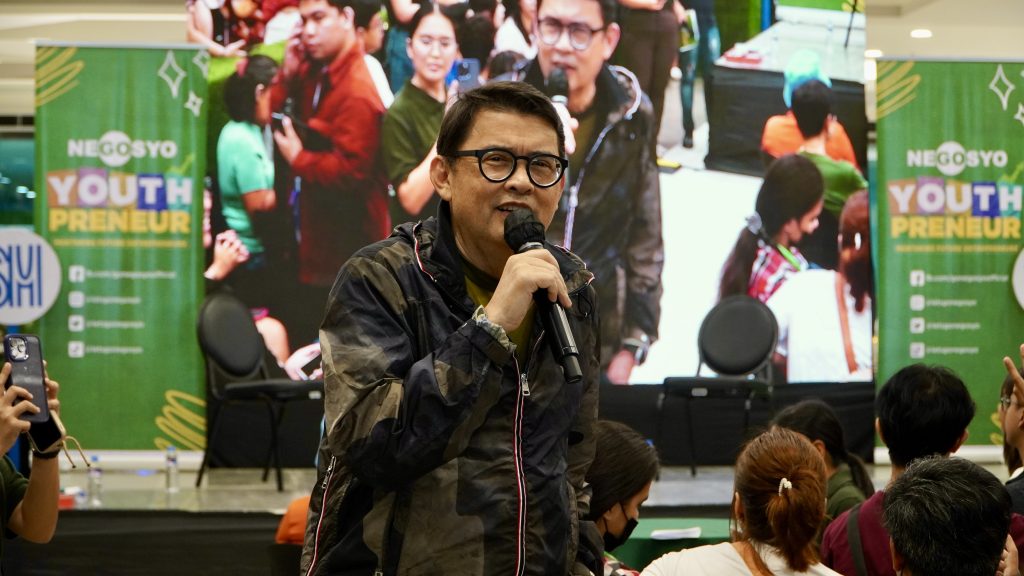
Go Negosyo Holds First Youth Entrepreneurship Event
November 25, 2023
Vice President Sara, Concepcion Sign MOA to Promote Entrepreneurship Among Youth
November 29, 2023
What Does AI Hold for the Future of Jobs and MSMEs?
I thought it was a coincidence that several of the activities I had participated in recently had a common intersection: digital technology. Looking back, it may not have been a conjunction of events at all, but rather a sign of the times.
A few weeks ago, I joined the President at several engagements during his week-long working visit to the United States for the 30th Asia-Pacific Economic Leaders’ Meeting in San Francisco, California. Among these was a meeting between the Philippine government and leading Silicon Valley companies to discuss Artificial Intelligence (AI) and cybersecurity, specifically on how the Philippines can upskill and retrain workers given the rapid development in these fields.
There was an economic briefing for US businessmen to invite them to invest in the Philippines, and a meeting with the Semiconductor Industry Association, where we expressed our readiness for collaboration and our plans to prioritize the semiconductor and electronics industries in the country.
When I arrived back from the APEC meetings, I shared with the media my thoughts on our discussions with the tech companies and with investors abroad. What I realized was this: Artificial Intelligence presents both opportunities and threats for the Philippines.
We have to upskill our people if in case eventually these jobs will just be given to machines. AI is accelerating at such a phenomenal phase, and we want to ensure that Filipinos continue to be employed.
At the same time, the technology coming out of Silicon Valley presents many opportunities to level the playing field for small entrepreneurs. These technologies that are being brought to the whole world, including the Philippines, are going to present tremendous opportunities for our Filipino MSMEs.
What most of the delegates from the Philippines found worrying, however, was the potential threats and challenges posed by AI to the country’s business process outsourcing (BPO) industry, which employs more than a million Filipinos and is worth billions of dollars for the Philippine economy. Beyond direct employment, BPOs benefit the real estate industry and the many small businesses that serve both their in-office and remote employees.
Along with a few other industries, there is a real and urgent need to upskill Filipino BPO workers to ensure job security in the face of AI. This technology will have an effect, and it is only a question of when. From the discussions we’ve had, this “question of when” sounds like it’s going to happen sooner than anyone anticipated.
However, I also see opportunities. During the pandemic, our MSMEs demonstrated how resilient and how willing they are to adapt to digital technology. They used e-wallets and delivery apps to continue doing business during the lockdowns. They discovered how they can use social media to promote their businesses, and many of them became influencers, a lot of whom we met during our public entrepreneurship mentoring events.
At the same time, we have to strengthen partnerships with countries and with companies that are leading the way in digitalization and offer platforms and innovations that can benefit the MSMEs in the Philippines.
Teaching more MSMEs to use digital technology will greatly contribute to greater inclusivity and economic growth. It has the potential to let MSMEs access professional backend tools like logistics management and accounting, and is an opportunity to upskill their workers to perform higher-value jobs.
The other activities I had following my arrival in the country also dovetailed with our meetings abroad. Last week, we held our Digital Shift Workshop, and we focused the session on AI. With the help of experts from Microsoft, Amazon, Google and Shore Marketing, we introduced the MSME participants to the potential of AI in not just writing copy and proposals using ChatGPT, but also in product development and even backroom chores.
Then just last Saturday, we held our Youthpreneur event, where we invited senior high school students from 17 schools around the metro and introduced them to entrepreneurship.
The successful turnout at our Youthpreneur event and the enthusiasm with which the students received our message of entrepreneurship is encouraging. More than 30 percent of the Philippine population is under 15 years of age, or what the social scientists and media call the Generation Alpha. They are the ones who were born into a world where the internet is as common a utility as water and electricity. They are digital-savvy, resourceful, creative and energetic; imagine how much potential they hold in becoming the next generation of entrepreneurs.
Meanwhile, almost 64 percent are still in the economically active range of 15 to 64, comprising Gen Z, Millennials, Gen X and a few younger Boomers. This is a curious mix since Gen X’ers know both the analog and the digital way of doing things, while the Millennials and Gen Z’ers came of age with the internet and digital technologies already having matured. These generations give perspective to how far we’ve come, and how much potential we have once the millions of unconnected and unbanked Filipinos are finally included into the new economy.
It was an intersection of the advocacy I started at Go Negosyo and the role I have as the lead of the Jobs Cluster of the Private Sector Advisory Council as well as chair of the ASEAN Business Advisory Council. These roles help me toward what I wish for every Filipino: A comfortable life free from poverty and equipped to contribute to the progress of the country. If digital technology and AI can help make this happen, then that should be good news.

2/F RFM Corporate Center, Pioneer cor. Sheridan Sts. Mandaluyong City, Metro Manila, Philippines

